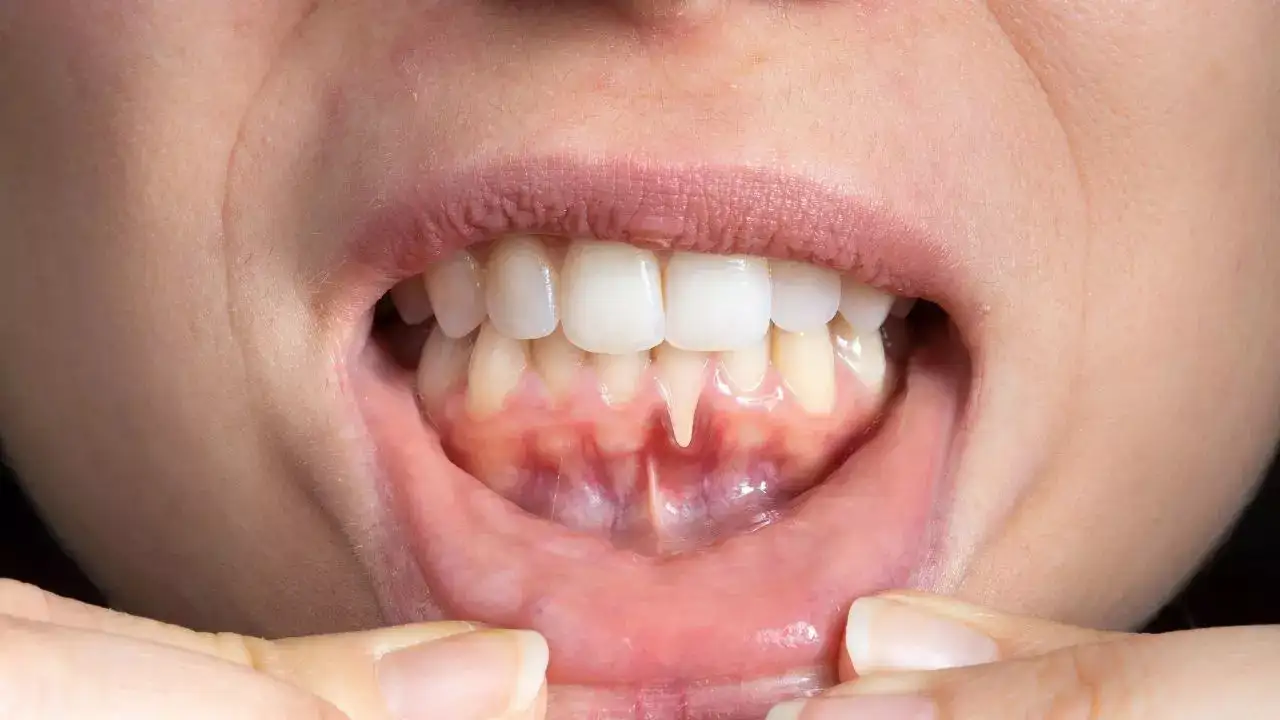Copyright indiatimes

Your teeth and gums are more than tools for chewing; they can reveal what is happening inside your body. Dentists are often the first to spot hidden health issues because many illnesses show early signs in the mouth long before other symptoms appear. Changes such as enamel erosion, gum colour, tooth mobility, or even grinding patterns can act as subtle warning signals. These oral changes may point to nutritional deficiencies, hormonal shifts, digestive problems or even conditions affecting the heart, kidneys or bones. In some cases, dental signs are the first clue that something more serious needs medical attention. Paying attention to what your mouth is telling you not only protects your smile but also supports overall well-being. Here are eight surprising things your teeth and gums may reveal about your health.8 hidden health problems your teeth and gums may revealWorn or thinning enamel may signal an eating disorderPersistent enamel erosion, especially on the inside surfaces of the teeth, may indicate frequent exposure to stomach acid. This can happen in conditions involving self-induced vomiting, where stomach acid repeatedly reaches the mouth and gradually erodes enamel. As enamel wears away, teeth become thin, weak, sensitive and more prone to chipping. According to a study published in the journal BMC Oral Health, people who engage in self-induced vomiting show significantly higher enamel erosion, particularly on the inner tooth surfaces, due to repeated stomach acid exposure.People with restrictive eating patterns may also lack essential nutrients, including calcium and vitamin D, which are needed to maintain strong teeth. While tooth erosion alone cannot diagnose an eating disorder, it is often one of the earliest visible signs and may prompt a dentist to recommend medical support.Pale or whitish gums can indicate possible anaemiaHealthy gums should look pink and firm. If gums appear unusually pale, whitish or almost translucent, it may indicate a lack of healthy red blood cells, a condition known as anaemia. When the body does not have enough red blood cells to carry oxygen, people can experience fatigue, dizziness and shortness of breath. Anaemia caused by deficiencies such as iron, vitamin B12 or folate often shows subtle oral signs before other symptoms become noticeable. Although gum colour alone cannot confirm a diagnosis, it may encourage a dental professional to advise a blood test.Loose teeth or bone loss around teeth may be a sign of osteoporosisOsteoporosis weakens bones throughout the body, and the jawbone is no exception. The jawbone supports teeth, and when bone density decreases, teeth may become loose, gums may recede, and gaps may develop. Dentists may notice changes during routine X-rays, sometimes before fractures or other symptoms appear elsewhere in the body. Osteoporosis is more common as people age and in those with low calcium intake, hormonal changes or sedentary lifestyles. While tooth loss can have many causes, unexplained loosening of teeth may indicate reduced bone density and the need for further medical assessment.Persistent gum inflammation may point to kidney diseaseKidney disease affects the body’s ability to filter waste and can weaken the immune system. People with reduced kidney function often experience dry mouth, changes in taste and increased inflammation. This inflamed environment encourages bacteria to grow, increasing the risk of gum disease. Gum inflammation may cause bleeding, swelling and eventually tooth loss if untreated. Studies suggest a two-way relationship: gum disease may worsen kidney health by allowing bacteria to enter the bloodstream. Regular dental check-ups can help manage symptoms and reduce complications for those with kidney concerns.White patches in the mouth may indicate oral thrush or immune issuesWhite, creamy patches on the tongue, inner cheeks or palate may indicate oral thrush, a fungal infection caused by an overgrowth of candida. Thrush can develop when the immune system is suppressed, such as in individuals with diabetes, respiratory illnesses, long-term antibiotic use or compromised immunity. It may cause discomfort, burning sensations and difficulty swallowing. Because oral thrush can sometimes signal underlying immune changes, persistent symptoms should be assessed by a healthcare professional.Tooth enamel erosion can be caused by acid refluxChronic acid reflux brings stomach acid into contact with the mouth, especially during night-time episodes. Frequent exposure dissolves the protective enamel layer, particularly on the back surfaces of teeth. Over time, teeth may become sensitive to hot or cold foods, change colour or develop small pits and notches. Severe erosion can alter the bite and make teeth more prone to cracking. Dentists can often spot the early signs during routine examinations, making it easier to identify reflux even before someone recognises digestive symptoms.Neglecting oral hygiene can signal cognitive declineA decline in consistent oral hygiene, especially in individuals who previously maintained excellent dental care, may be an early sign of cognitive or memory decline. Forgetting routine brushing, skipping dental check-ups or allowing food debris to build up can signal difficulty with daily self-care. According to a study published in the journal Frontiers in Aging Neuroscience, adults with greater tooth loss had a higher risk of cognitive decline and dementia, suggesting that oral health and brain health are closely linked.Grinding teeth during sleep may be linked to sleep apnoeaJaw clenching or grinding during sleep, known as bruxism, can indicate disrupted breathing patterns. Research suggests that a significant number of people with obstructive sleep apnoea also grind their teeth at night. Teeth may appear worn down, flattened or chipped, and people may wake with jaw pain or morning headaches. Sleep apnoea is a serious condition linked to high blood pressure, cardiovascular disease and type 2 diabetes, so recognising grinding as a potential clue can lead to important early intervention.Disclaimer: This article is for general informational purposes only and is not a substitute for professional medical advice, diagnosis, or treatment. Always seek the guidance of a qualified healthcare provider regarding any medical condition or lifestyle change.Also Read: 5 Foods that don’t mix well with diabetes medications and may affect blood sugar



